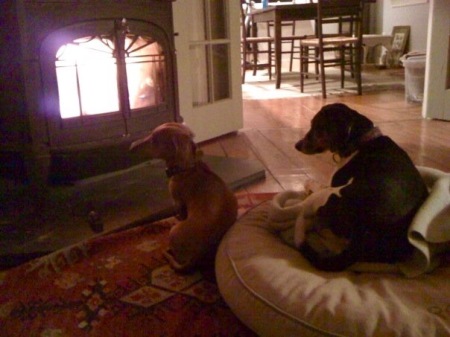Mid-April in northern Vermont, dusk falls, the sky turns grey. My house glows a little against the dark. The thermometer had peaked above fifty and now falls to the thirties.
Inside, the wood stove still burns. I walk into the night, to the wood shed. Arm-load by arm-load, I pace the dimensions of a season, five cords by twenty-six weeks. Half a year! This fire has burned almost continuously since fall, each morning’s embers raked and kindled anew, tonight’s flame direct kin from the match struck in October.
The fire burned from November through January, blazing against deepening darkness and cold. Winter seeped around locked doors and windows, a glacial rebuke against the stove’s fiercest inferno. Sometime in February, a balance emerged between heat and snow. And now, into spring, the stove holds the upper hand. Finally, the house is hot. In fact, increasingly the house is too hot, and I shed layers. Yet still I feed the stove: the novelty of so much heat outweighs any discomfort.
My home is a small two-story farm house from the 1820s. The stove sits centrally, in the living room, attempting to heat the entire house. A propane furnace in the basement kicks on in the dead of night, when the logs have burned to embers, but otherwise the stove carries the greatest burden, working non-stop shifts. The fire becomes the center of winter activity: eating, reading, writing, resting, talking, gaming, music, coffee, tea, beer, all unroll in the stove’s warm light.
Patterns of flame fascinate and mesmerize, like waves crashing at the shore. There is an expression, “like a moth to the flame,” but in truth a fire draws all of us, we are all like moths to flame. We all want to lie in the heat that becomes too hot. We gaze into the fire and enjoy a gentle hypnosis. Witness Hank and Rosie, basking in heat, peering to the fire in canine contemplation:
The ancient Greeks believed fire was one of four fundamental elements, alongside earth, air, and water. Only fire permits a somewhat intimate approach. The magnificence of mountains and oceans cannot be captured in my living room, but man has lived with fire since the first cave dwellings. Perhaps this explains fire’s primordial fascination, a force that is awesome and ancient yet somehow our fellow traveller through the ages, a welcome and warming companion.
With spring’s arrival, soon I’ll let the fire die. It will be nice to forget the associated chores — carrying wood, emptying ashes, sweeping up stray bits of bark and cinder — and good to open windows to the breeze. It will also be nice in a week, when my clothing loses its smokey scent, and this may improve my social standing. In May, the chimney man will come to inspect and sweep the chimney. And the stove, the glowing centerpiece for six full months, will sit dark and quiet until fall.








Good to see your taking time to write again. It was beautifully written.
This pyro loved every word. Your pups look mesmerized!
I loved reading this delightful account of your happiness with your woodstove and all that goes with it. I believe we have the same exact stove and it is the focus of our lives in the winter months. Jilly
David, loved your essay. You have the soul of a poet!